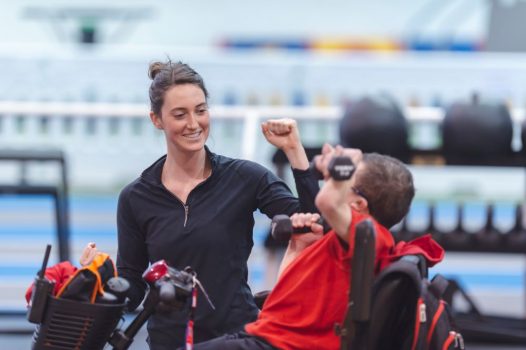
An accredited exercise physiologist (AEP) is an allied health professional with extensive training in understanding the body’s response to exercise, although people still confuse them with personal trainers.
There really is no comparison because fitness professionals work in the sport and recreation sector, whereas AEPs work in the health sector and have wide-ranging qualifications and training.
To become an accredited exercise physiologist in Australia, a person must:
- Complete a four-year accredited degree course at university
- Fulfil 500 hours of clinical experience as part of the degree
- Gain Exercise and Sports Science Australia accreditation
And to maintain their accreditation, an exercise physiologist must also complete annual continuing professional development, work under a code of ethics, and hold valid first aid and CPR certificates.
So what does an exercise physiologist do?
An AEP is an allied health professional who specialises in the delivery of exercise, lifestyle and behavioural modification programs to prevent and manage chronic diseases, injuries and disabilities.
They put together individual exercise and lifestyle programs, provide education on how to maintain an active lifestyle and make sure exercise programs are safe, effective and tailored for the individual.
Services delivered by an AEP seek to restore optimal physical function, health and wellness. They are available under the NDIS and are also claimable under Medicare and most private health insurers.
Who do exercise physiologists work with?
Exercise physiologists support clients with a range of conditions, including those living with disability, cardiovascular disease, diabetes, osteoporosis, mental health problems, cancer, arthritis and more.
The main goal is to improve a person’s quality of life and function and promote greater independence.
AEPs work with people of all ages and abilities in a range of health settings, including public and private hospitals, private clinics, government and not-for-profit organisations, workplace health and rehabilitation, aged care facilities, fitness centres, gyms and sports organisations.
What are the benefits of exercise physiology?
Exercise interventions have physical, mental, and emotional benefits for people living with disability, including better cardiovascular fitness, muscular strength, coordination and balance, and fewer symptoms of depression and anxiety, and pain.
Some of the benefits of an exercise physiology program tailored specifically for you include:
- Improved mental health, wellbeing and self-esteem
- The ability to effectively self-manage your condition
- Improved mobility and physical function
- Pain reduction
- Greater independence and the ability to achieve important life goals
When should I consider seeing an AEP?
If you are living with disability there are a number of lifestyle changes that you may need to manage. Your condition may mean that you are experiencing one or more of the following:
- Reduced mobility
- Inactivity
- Deconditioning
- Depression
- Fatigue
- Weakness
- Balance issues
An AEP can give you the tools you need to manage these health issues, with an exercise program that improves your cardiovascular fitness, muscular strength and balance, and decreases your symptoms of depression and anxiety, and reduces pain.
With accreditation through Exercise and Sports Science Australia and backgrounds in rehabilitation, every Exercise Physiologist in Australia is held to high standards. Ability Action Australia’s AEPs can help you learn how to manage and improve your health to become more independent and achieve your goals.
We have the knowledge and skills to deliver safe and effective exercise interventions to help you live a better life today.
If you would like further information or to speak to us, please contact our friendly concierge service on 1800 238 958 or complete the request contact form and we will contact you at a time that suits you best.

